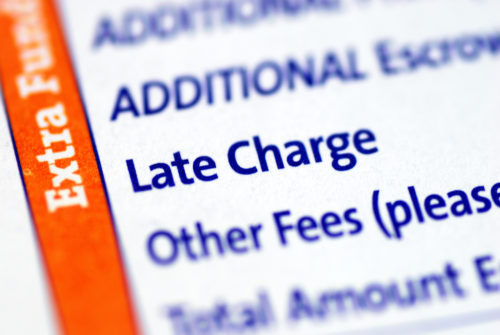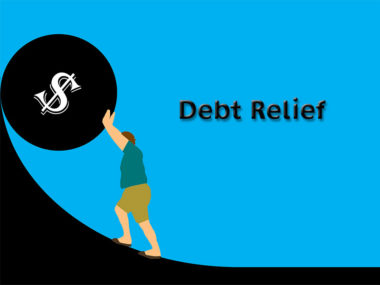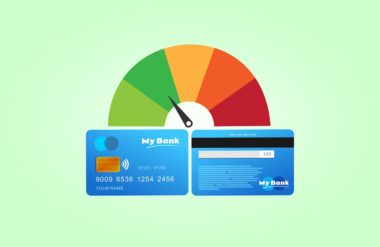Many of us have been there. All too often, a bill slips your mind, an emergency takes up funds that were meant to be dedicated to something else, or discretionary spending gets in the way of your budgetary priorities.
Sometimes bills happen to fall by the wayside. While late payments are certainly not unheard of in today’s debt economy, they can have serious consequences.
Table of Contents
What Is a Late Payment Penalty?
Late payment penalties typically come in the form of monetary consequences. You might be expected to pay a late fee, and interest could be added to your balance depending on your annual percentage rating.
Perhaps more importantly, though, late payments can show up on your credit report for seven years, dragging your scores down and making it more difficult to qualify for new lines of credit. For those looking to make big purchases, such as a home or a car, missing a payment can dramatically impact your chances of being approved for a loan, as well as affect the desirability of the loan you are offered.
The consequences for each vary, however. Below, we cover what might happen if you happen to be late for a credit card, car, or home loan payment.
Late Credit Card Payment
According to the experts at Experian, the most advisable course of action to take when you miss a credit card payment is to contact your credit card issuer and pay it off as soon as possible. Not only will this help you to keep from incurring additional interest charges, but it can also help you to prevent causing any harm to your credit score.
Reporting to Credit Bureaus
Credit card issuers typically do not report late payments to the big three credit bureaus unless you’ve missed a complete billing cycle. Typically these billing cycles last for 30 days. If you’re a few days late for your payment, you shouldn’t have to worry about your credit score being affected.
Late Fees
You may still have to deal with the other negative consequences, such as late fees. Depending on your credit card issuer, you may also have to pay a penalty interest rate. However, sometimes individuals may be able to negotiate these extraneous fees.
“It’s always worth it to call your card issuer and request a waiver of the late fee,” Ismat Mangla of Experian writes. “Many issuers are flexible about this, especially if you haven’t been late in the past.”
Negotiating Late Payment Forgiveness
Mangla recommends going into the conversation with a script in mind. If you’ve been good about paying your bills on time in the past, be sure to mention that during your call with the customer service representative. Most will be willing to credit any late fees back to you if you’ve been a customer that generally pays their bills on time.
Avoid Late Payments With Autopay
Regardless, it may be worth it to explore enrolling in an autopay program that will automatically pay the minimum payment on your accounts on a specific day each month. That way, if you happen to forget to pay a credit card, you’ll automatically be covered. Many experts suggest setting the auto-payment up for five days before the bill is due so you won’t have to worry about payments being delayed due to weekends or holidays.
Late Car Payment
There are a number of reasons one might be unable to make a car payment. Job loss, medical emergencies, and family emergencies are just a few of the reasons that the Department of Motor Vehicles site as reasons they families and individuals might miss their car payments.
Late Payment Fees
The late fees associated with missing or late car payments will depend on your lender, the contract present, and state law, according to the Consumer Financial Protection Bureau (CFPB). Check your contract to determine what the terms and conditions of your agreement are. Some may provide a grace period to your loan, others may issue a late payment fee right away.
As with most missed or late payments, your best bet to resolve the issue should be to contact the institution or individual who has issued your loan. Typically these lenders want to keep their customers and are willing to explore ways to help you adjust your payment options.
Discuss Your Payment History
As you prepare to contact your lender, be prepared to disclose the reasons you are unable to make your payments. Also be prepared to divulge your payment history. If you have a history of making payments on time, your lender might be more prepared to work with you moving forward.
Avoiding Repossession
If your payment history has been less than ideal, it’s still important to have open communication with your lender. They will likely take your payment history, credit score, and individual circumstances into consideration when making a decision as to how to move forward. Regardless of the circumstances involved, it is important that you be as communicative with your lender as possible so you can avoid vehicle repossession and the subsequent ding to your credit score.
There are a number of ways in which lenders may choose to help you when it comes to the terms of your auto loan. Some available options include deferring your payments, changing your payment date, modifying the terms of your loan, waiving late fees, or refinancing your auto loan.
Late Mortgage Payment
As with car loans, mortgage payments can become a burden for those going through a financial crisis. The consequences for doing so may vary, however, depending on how far behind you are in missed payments and the area of the United States that you live in.
Mortgage Loan Grace Period
Generally speaking, lenders will give borrowers a 15-30 day grace period after a missed payment before they will assess a late fee or report it to one of the major Credit Reporting Bureaus. As with other missed payments, missing a single mortgage payment has the potential to negatively impact your credit score, and will likely remain on your credit report for seven years. The severity of the impact you’ll face will depend on how delinquent your account is with lenders.
As you might expect, the longer your account remains delinquent, the more your credit score will be affected.
Communicate Before Making Late Payments
Once again, communication is key. If you know you’re going to have a hard time making your mortgage payment in a timely manner, reach out to your loan servicer to explore any options that may be available. They may be able to help you navigate a forbearance, refinancing options, government loan modification, or other kinds of repayment plans. Loan modification under the Mortgage Forgiveness Debt Relief Act of 2007 may also be an option worth looking into with your creditor.
If you neglect to reach out and also neglect to make payments for a significant period of time, you might run the risk of foreclosure.
What to Do If You’ve Made a Late Payment?
Regardless of how good you are at managing your personal finances, it’s likely that there’s a time in your life where a bill will fall through the cracks. Unfortunately it’s a mistake that can affect your finances for many years to come.
Late payments aren’t always a negative sentence for your credit report. So long as you’re open and communicative with your creditor, especially before you make a late payment, it’s likely that you can come to a solution to your specific needs and circumstances.
Addressing the issue head on is really the only way to mitigate damage to your credit score. Getting caught up as quickly as possible means that your blunder, no matter the reason, will make a minimal impact on your personal finances, your assets, and your credit report overall.
Image Source: https://depositphotos.com/





